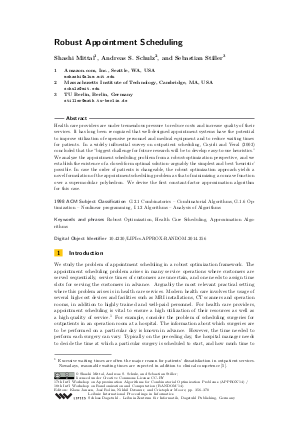Robust Appointment Scheduling
Authors Shashi Mittal, Andreas S. Schulz, Sebastian Stiller
-
Part of:
Volume:
Approximation, Randomization, and Combinatorial Optimization. Algorithms and Techniques (APPROX/RANDOM 2014)
Part of: Series: Leibniz International Proceedings in Informatics (LIPIcs)
Part of: Conference: International Conference on Randomization and Computation (RANDOM)
Part of: Conference: International Conference on Approximation Algorithms for Combinatorial Optimization Problems (APPROX) - License:
 Creative Commons Attribution 3.0 Unported license
Creative Commons Attribution 3.0 Unported license
- Publication Date: 2014-09-04
File

PDF
LIPIcs.APPROX-RANDOM.2014.356.pdf
- Filesize: 469 kB
- 15 pages
Document Identifiers
Subject Classification
Keywords
- Robust Optimization
- Health Care Scheduling
- Approximation Algorithms
Metrics
- Access Statistics
-
Total Accesses (updated on a weekly basis)
0PDF Downloads0Metadata Views
Abstract
Health care providers are under tremendous pressure to reduce costs and increase quality of their services. It has long been recognized that well-designed appointment systems have the potential to improve utilization of expensive personnel and medical equipment and to reduce waiting times for patients. In a widely influential survey on outpatient scheduling, Cayirli and Veral (2003) concluded that the "biggest challenge for future research will be to develop easy-to-use heuristics." We analyze the appointment scheduling problem from a robust-optimization perspective, and we establish the existence of a closed-form optimal solution--arguably the simplest and best `heuristic' possible. In case the order of patients is changeable, the robust optimization approach yields a novel formulation of the appointment scheduling problem as that of minimizing a concave function over a supermodular polyhedron. We devise the first constant-factor approximation algorithm for this case.
Cite As Get BibTex
Shashi Mittal, Andreas S. Schulz, and Sebastian Stiller. Robust Appointment Scheduling. In Approximation, Randomization, and Combinatorial Optimization. Algorithms and Techniques (APPROX/RANDOM 2014). Leibniz International Proceedings in Informatics (LIPIcs), Volume 28, pp. 356-370, Schloss Dagstuhl – Leibniz-Zentrum für Informatik (2014)
https://doi.org/10.4230/LIPIcs.APPROX-RANDOM.2014.356
BibTex
@InProceedings{mittal_et_al:LIPIcs.APPROX-RANDOM.2014.356,
author = {Mittal, Shashi and Schulz, Andreas S. and Stiller, Sebastian},
title = {{Robust Appointment Scheduling}},
booktitle = {Approximation, Randomization, and Combinatorial Optimization. Algorithms and Techniques (APPROX/RANDOM 2014)},
pages = {356--370},
series = {Leibniz International Proceedings in Informatics (LIPIcs)},
ISBN = {978-3-939897-74-3},
ISSN = {1868-8969},
year = {2014},
volume = {28},
editor = {Jansen, Klaus and Rolim, Jos\'{e} and Devanur, Nikhil R. and Moore, Cristopher},
publisher = {Schloss Dagstuhl -- Leibniz-Zentrum f{\"u}r Informatik},
address = {Dagstuhl, Germany},
URL = {https://drops.dagstuhl.de/entities/document/10.4230/LIPIcs.APPROX-RANDOM.2014.356},
URN = {urn:nbn:de:0030-drops-47089},
doi = {10.4230/LIPIcs.APPROX-RANDOM.2014.356},
annote = {Keywords: Robust Optimization, Health Care Scheduling, Approximation Algorithms}
}
Author Details
References
-
Mehmet A. Begen, Retsef Levi, and M. Queyranne. A sampling-based approach to appointment scheduling. Technical report, Sauder School of Business, University of British Columbia, 2008. Working Paper.

-
Mehmet A. Begen and Maurice Queyranne. Appointment scheduling with discrete random durations. Mathematics of Operations Research, 36:240-257, 2011.

-
Aharon Ben-Tal and Arkadi Nemirovski. Robust optimization - methodology and applications. Mathematical Programming, 92:453-480, 2002.

-
Dimitris Bertsimas and Melvyn Sim. The price of robustness. Operations Research, 52:35-53, 2004.

-
T. Cayirli and E. Veral. Outpatient scheduling in healthcare: a review of literature. Production and Operations Management, 12:519-549, 2003.

-
Brian Denton and Diwakar Gupta. A sequential bounding approach for optimal appointment scheduling. IIE Transactions, 35:1003-1016, 2003.

-
Satoru Fujishige. Submodular Functions and Optimization, volume 58 of Annals of Discrete Mathematics. Elsevier, 2005. 2nd edition.

-
Linda V. Green, Sergei Savin, and Ben Wang. Managing patient service in a diagnostic medical facility. Operations Research, 54:11-25, 2006.

-
Diwakar Gupta. Surgical suites' operations management. Productions and Operations Management, 16:689-700, 2007.

-
Wiebke Höhn and Tobias Jacobs. On the performance of Smith’s rule in single-machine scheduling with nonlinear cost. In LATIN, pages 482-493, 2012.

-
Oscar H. Ibarra and Chul E. Kim. Fast approximation algorithms for the knapsack and sum of subset problems. Journal of the ACM, 22:463-468, 1975.

-
Satoru Iwata. Submodular function minimization. Mathematical Programming, 112:45-64, 2008.

-
Guido C. Kandoorp and Ger Koole. Optimal outpatient appointment scheduling. Health Care Management Science, 10:217-229, 2007.

-
Nicole Megow and José Verschae. Dual techniques for scheduling on a machine with varying speed. In ICALP, pages 745-756, 2013.

-
James B. Orlin. A faster strongly polynomial time algorithm for submodular function minimization. Mathematical Programming, 118:237-251, 2009.

-
Maurice Queyranne. Structure of a simple scheduling polyhedron. Mathematical Programming, 58:263-285, 1993.

-
Lawrence W. Robinson and Rachel R. Chen. Scheduling doctor’s appointments: Optimal and empirically-based heuristic policies. IIE Transactions, 35:295-307, 2003.

-
W. E. Smith. Various optimizers for single-stage production. Naval Research Logistics Quarterly, 3:59-66, 1956.

-
Sebastian Stiller and Andreas Wiese. Increasing speed scheduling and flow scheduling. In ISAAC, pages 279-290, 2010.

-
P. Patrick Wang. Static and dynamic scheduling of customer arrivals to a single-server system. Naval Research Logistics, 40:345-360, 1993.

-
P. Patrick Wang. Sequencing and scheduling n customers for a stochastic server. European Journal of Operational Research, 119:729-738, 1999.

